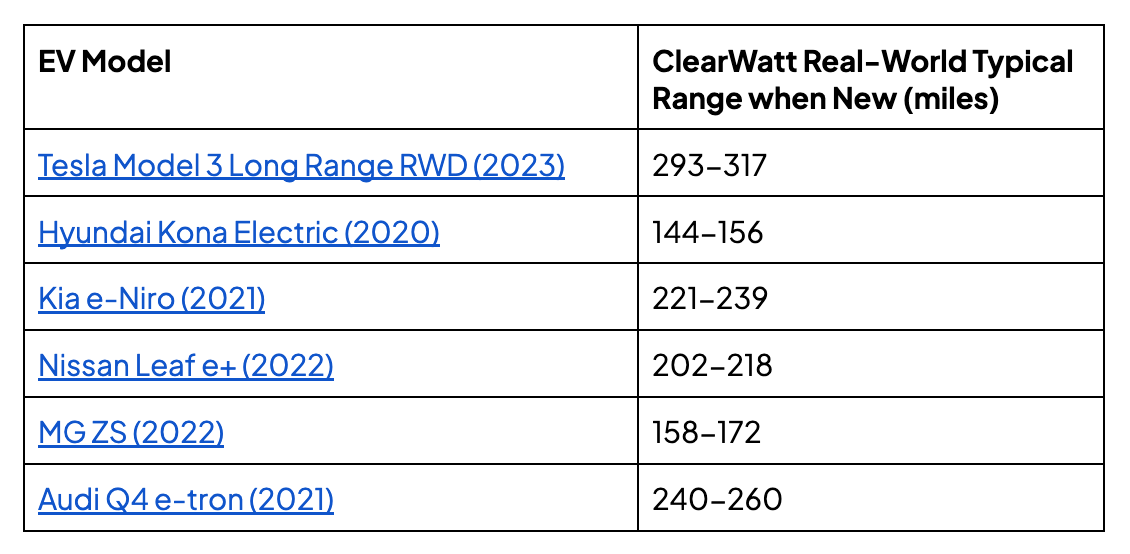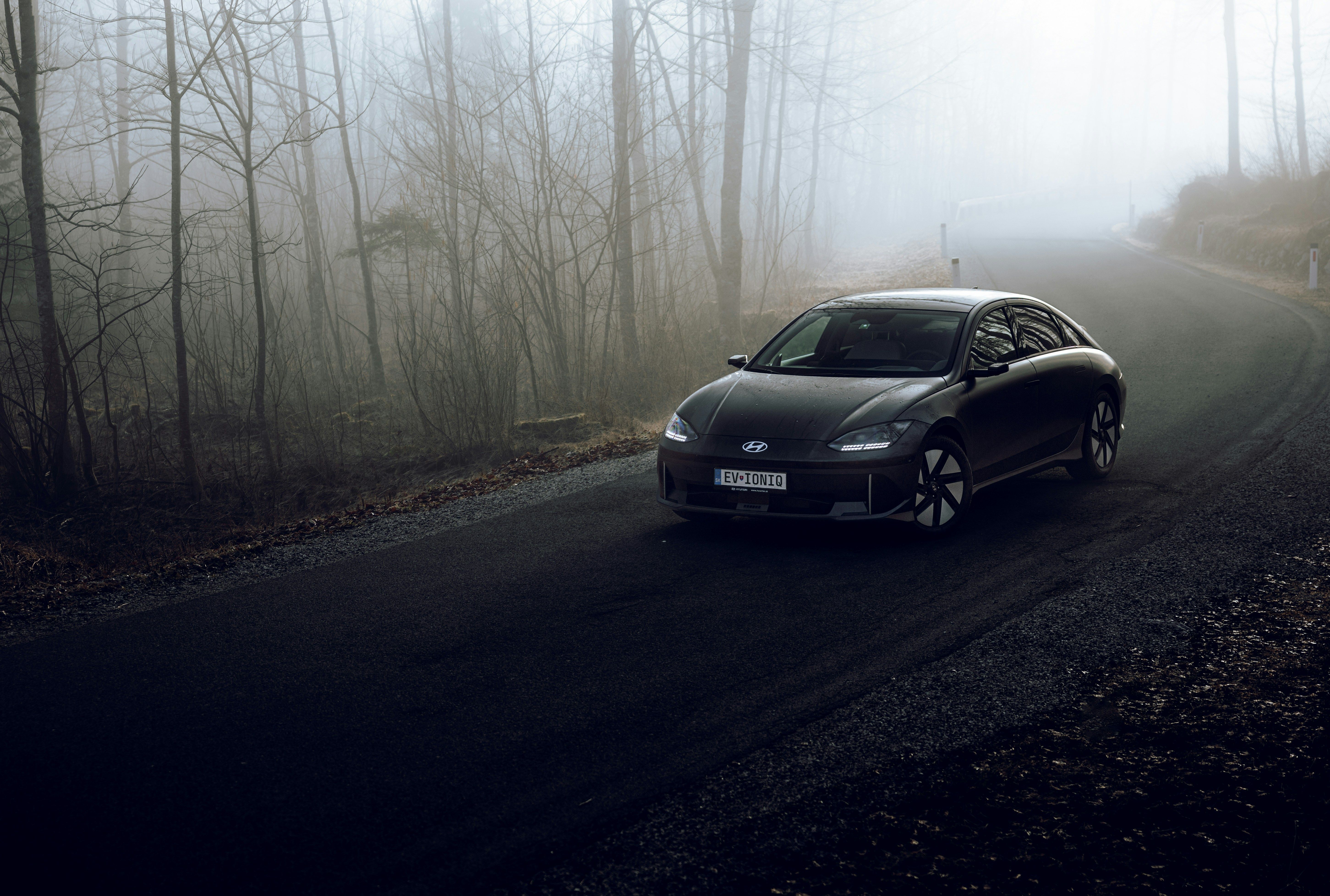Electric vehicles have rapidly shifted from niche curiosities to mainstream contenders in the automotive world and have been on our roads for more than a decade, yet despite their growing popularity and technological advances, misconceptions still remain. From concerns about battery health and charging infrastructure to questions about environmental impact and performance, many potential EV drivers find themselves navigating a maze of conflicting information and outdated assumptions. These myths often stem from early EV limitations that have since been addressed, or from misunderstandings about how electric vehicles actually work in daily life. Understanding EV running costs and real-world range capabilities has never been more important for consumers trying to make informed decisions about their next car purchase. In this blog post we have covered some of the most searched EV myths in 2025.
“EV Batteries Don’t Last”
Despite the myth, EV batteries show impressive longevity, much better than consumers may fear. The average EV experiences degradation rates of 1.5-2% per year based on regular usage. For instance in the UK, the Tesla Model S, launched over a decade ago, has shown impressive battery capacity retention thanks to its advanced pack cooling system. .
EV manufacturers offer comprehensive EV battery warranty coverage, typically 8-year/100,000 mile battery warranties, which are significantly longer than the typical 3-year warranties on petrol/diesel cars. While electric car battery replacement costs can be a concern for some drivers, the extended warranty coverage provides peace of mind.
While real-world data consistently shows that EV batteries are built to last, degradation rates can vary depending on usage patterns, charging habits, climate, and other factors. On average, degradation remains very low thanks to modern battery management systems, improved pack thermal management, and good driving behaviour. However, some vehicles may experience higher or lower degradation than the average. That’s why it’s helpful to test your EV individually with the ClearWatt EV Health Test, for a comprehensive report about your EV performance.
“EVs Are Prone to Fires”
Despite sensationalist headlines, the claim that electric vehicles are more prone to fires than petrol or diesel cars is not supported by evidence. When looking at statistics showing a rise in electric car fires, it’s important to also consider the growing number of EVs on the road.
According to the UK Fire Brigade, fires involving EVs are rare, accounting for a fraction of vehicle fires annually. Swedish transport authority data further confirms this, showing that internal combustion engine (ICE) vehicles are significantly more likely to catch fire (about 20 times more often than EVs).
EVs undergo rigorous safety testing and incorporate advanced battery management systems designed to prevent overheating and short circuits, making them inherently safer. In reality, EVs are not only less likely to catch fire, but when fires do occur, they often result from external impacts rather than spontaneous battery failure.
“EVs Are Too Expensive”
This claim no longer holds up, especially in the UK market where prices have dropped significantly. Used EVs are now widely accessible, with models like the Nissan Leaf and Renault Zoe available for under £9,000, according to Autotrader’s 2024 data. Reports show that average used EV prices have fallen by over 30% since 2022. In many cases, used EVs now cost the same as or less than their petrol counterparts; for example, a 2020 VW e-Golf sells for around £14,000, similar to a petrol Golf of the same year. ClearWatt EV Check Plus helps ensure that buyers get a good deal by providing real-world range insights and pricing insights, making it easier to compare cars and buy a reliable used EV with confidence.
Here are some affordable used EVs currently on the market:
Nissan Leaf (2016–2018): ~£7,000–£9,000
Renault Zoe (2018–2019): ~£6,000–£8,500
Hyundai Ioniq Electric (2017–2019): ~£9,000–£11,000
In addition to falling purchase prices, EVs are also significantly cheaper to run. For a 300-mile journey, charging an electric vehicle at home typically costs around £10, based on an average rate of 8p per kWh. In contrast, fuelling a petrol car to cover the same distance usually costs around £25, assuming an average fuel cost of 14p per kWh equivalent. Over time, this difference can lead to savings of up to £750 per year for drivers who primarily charge at home.. EVs also have fewer moving parts and no need for oil changes, meaning maintenance costs can be 20–30% lower over the life of the vehicle. As the price gap between EVs and petrol cars continues to shrink and value parity becomes more common, the idea that EVs are “too expensive” is increasingly outdated.
“EVs Don’t Have Enough Range”
According to the Department for Transport, the average car journey in the UK is just 8.4 miles, and even among longer trips, less than 5% of journeys exceed 100 miles. Most electric vehicles on the new and second-hand market today offer an electric vehicle range of at least 150–300 miles on a single charge, with many models now surpassing 300 miles. This EV average range comfortably exceeds the daily needs of the vast majority of drivers, helping to reduce EV range anxiety concerns.
Below are some real-world range examples of electric cars with different makes and models, demonstrating range insights when new from our EV Explorer:

Furthermore, concerns about EVs running out of charge are not supported by statistics. Data from the AA indicates that running out of battery was responsible for less than 2% of EV breakdowns in 2024 which is less than traditional fuel-related breakdowns in petrol and diesel cars.
“EVs Are Useless in Winter”
While electric cars do experience range reduction in cold weather, typically about 15–40%, this is not unique to EVs. Petrol and diesel cars also suffer efficiency losses, often 15–20%, due to factors like cabin heating. Cold weather impacts battery efficiency and overall energy consumption across all vehicle types regardless of fuel type. Cold weather affects all vehicle types, but that doesn’t render them unusable.
In reality, EVs are increasingly ready for winter, thanks to innovations like heat pumps, which are far more efficient than traditional resistive heaters and help retain range while maintaining battery efficiency. Many EVs also support pre-conditioning, allowing the cabin and battery to be warmed using grid power before a trip. The widespread use of EVs in Norway, where over 80% of new cars sold are electric despite long, harsh winters, demonstrates that EVs are viable in winter conditions.
“There Aren’t Enough Chargers”
The claim that “there aren’t enough chargers” in the UK is increasingly outdated. As of early 2025, there are over 60,000 public charge points, including more than 10,000 rapid or ultra-rapid chargers, according to ZapMap, and the government plans to scale this to 300,000 by 2030. Around 80% of EV drivers currently charge at home which is not only convenient but also reduces battery degradation over time by placing less strain on the battery. As mentioned above, real-world data shows that fewer than 4% of EV breakdowns are caused by running out of charge; a figure lower than that of ICE vehicles. With accurate route planning tools, live charger availability, and a rapidly growing network, range anxiety is increasingly a myth. While occasional queues may occur in busy areas, the infrastructure is expanding fast enough to support the growing EV population and enable confident, long-distance travel.
Still Confused About EVs? Facts Beat Fear Every Time
As we've covered, EV batteries last longer than expected, charging infrastructure is rapidly expanding across the UK, and real-world range comfortably meets most drivers' daily needs.
When considering your next vehicle purchase, don't let fear-inducing headlines drive your decision. Instead, before making any EV purchase, especially in the used market, consider using ClearWatt's EV Check Plus for a pre-purchase report. This provides range insights in different conditions, information about the vehicle’s warranties and all data needed about the specific EV you’re looking for, helping you make informed decisions based on real data rather than assumptions.
The transition to electric vehicles is happening. By separating fact from fiction and relying on reliable data rather than persistent myths, UK drivers can confidently discover that EVs offer practical advantages in running costs, maintenance, and daily convenience.
Reviewed on: 29th May 2025
Next review scheduled: 29th November 2025
